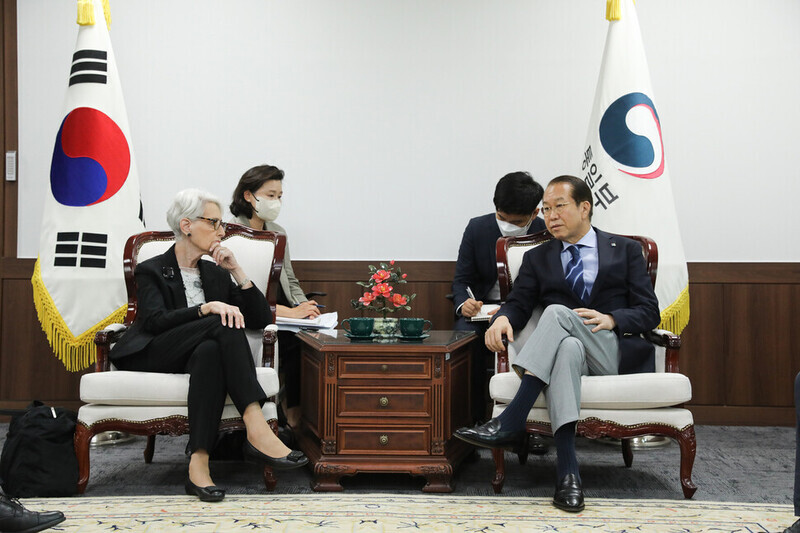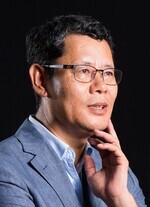hankyoreh
Links to other country sites 다른 나라 사이트 링크
[Guest essay] The future of hostile neglect of North Korea


By Kim Yeon-chul, former minister of unification and current professor at Inje University
South Korea and the US have lost their way when it comes to North Korea policy. A military solution would be impossible given the North’s nuclear arsenal, and a blockade would be limited by its cooperation with China and Russia.
If engagement is rejected for political reasons, in the end, all you have left is ignoring the North. That’s not a new policy. The Obama administration’s policy of “strategic patience” was a policy of neglect.
That began as benign neglect, or waiting for North Korea to show that it was serious about negotiating, but it ultimately devolved into hostile neglect, or waiting for the North Korean regime to collapse.
Patience and neglect weren’t policy objectives. Rather, they were what happened in the fullness of time, given the lack of available measures, and no determination to find a solution.
Officials may say the door to dialogue is open, but disinterest doesn’t lead to dialogue. When the Biden administration carried out its review of North Korea policy in April 2021, it promised to find a middle ground between the Obama administration’s policy of doing nothing and the Trump administration’s policy of doing anything.
But North Korea policy was outweighed by the strategic competition with China in US priorities, and Russia’s invasion of Ukraine sapped even more American interest in Pyongyang, ultimately culminating in neglect.
Contrary to what’s implied by the phrase “benign neglect,” there’s nothing benign about neglect. Neglect is a signal of distrust, which fuels an arms race and further cramps opportunities for dialogue.
Neglect has always been a trigger for hostility, rather than a backdrop for dialogue.
After the Hanoi summit ended in rupture in February 2019, North Korea also reverted to neglect. Pyongyang has sided with China in its strategic competition with the US, while expanding its nuclear arsenal and raising the stakes for negotiations with the US.
Since Yoon Suk-yeol became South Korean president, North Korea has pivoted from benign neglect to hostile neglect in its relationship with the South. The Korean Peninsula has now entered a vicious cycle of hostile neglect.
There’s nothing to be gained from neglect. The critical flaw of neglect is that it represents a misjudgment of time. As the Taliban once said, and as Putin in Russia now believes, the US has the watches, but they have the time.
The concept of time in an authoritarian state is different from that of democratic states that hold elections. The same is true of North Korea.
While sanctions continue to bite, North Korea has gotten more backing from China and Russia, since their strategic interests intersect. When these three northern powers increase cooperation, the efficacy of sanctions decreases proportionally.
If North Korea tests another nuclear device or launches another ballistic missile, it won’t be easy to impose additional sanctions. Russia, as a permanent member of the UN Security Council, is vetoing nearly everything that hits the discussion table.
What’s even more important is that North Korea already faces the maximum sanctions. One weakness of sanctions is that they create a humanitarian crisis for vulnerable populations but aren’t effective enough to force leaders to change their policies.
So sanctions by the international community don’t clear the threshold of not causing a humanitarian crisis.
Neglect inevitably exacerbates a situation into something worse. The reason “strategic patience” is considered a policy failure is because of its outcome.
Since North Korea has steadily increased its nuclear capacity over the past three decades, there haven’t been any policies for dealing with the country that could be called successful. That said, the pace of North Korea’s nuclear development has been markedly different in times of negotiation than in times of neglect.
It was during the phase of past neglect that North Korea raced to the threshold of becoming a de facto nuclear weapon state. If we go back to neglect through the non-strategy of disinterest, we’ll be forced to watch Pyongyang go dashing across the finish line.
Unfortunately, this is not a time of negotiation. The environment for dialogue requires efforts on both sides, and a one-sided effort faces limitations. North Korea has made inter-governmental dialogue more difficult by ramping up its unification drive and defining relations with the South as hostile.
Nevertheless, there’s no need for us to aggravate the deterioration of that relationship. Nor is this a time to exploit the North Korean issue for reasons of domestic politics.
While the public is strongly critical of North Korea, a majority of South Koreans also put stock in the government’s ability to manage the situation. That’s why playing up the threat of North Korea doesn’t always pay off politically.
When the situation can’t be resolved, it has to be managed. The clouds are gathering for a long-term structural crisis in the economy. Maintaining stability on peninsular affairs is essential for emerging from the tunnel of that economic crisis.
To end the vicious cycle of hostile regret, we need to seek lessons and wisdom in past failures, create a national consensus, and reach across the aisle.
What we need is not neglect, but interest. It’s only when we recognize the other side that we can begin negotiations; it’s only when we recognize the problem that we can find a solution.
We need to wait for the other party to change, but managing the situation is on us. The boundary that divides South and North Korea now runs across all of East Asia as well.
The deterioration of inter-Korean relations will bring military competition between the US and China onto the Korean Peninsula. We already know the future of hostile neglect. Now is not the time for yet another failure.
Please direct questions or comments to [english@hani.co.kr]

Editorial・opinion
![[Column] Samsung’s ‘lost decade’ and Lee Jae-yong’s mismatched chopsticks [Column] Samsung’s ‘lost decade’ and Lee Jae-yong’s mismatched chopsticks](https://flexible.img.hani.co.kr/flexible/normal/500/300/imgdb/original/2024/0512/3017154788490114.jpg) [Column] Samsung’s ‘lost decade’ and Lee Jae-yong’s mismatched chopsticks
[Column] Samsung’s ‘lost decade’ and Lee Jae-yong’s mismatched chopsticks![[Correspondent’s column] The real reason the US is worried about Chinese ‘overcapacity’ [Correspondent’s column] The real reason the US is worried about Chinese ‘overcapacity’](https://flexible.img.hani.co.kr/flexible/normal/500/300/imgdb/original/2024/0510/5217153290112576.jpg) [Correspondent’s column] The real reason the US is worried about Chinese ‘overcapacity’
[Correspondent’s column] The real reason the US is worried about Chinese ‘overcapacity’- [Editorial] Yoon’s gesture at communication only highlights his reluctance to change
- [Editorial] Perilous stakes of Trump’s rhetoric around US troop pullout from Korea
- [Guest essay] Preventing Korean Peninsula from becoming front line of new cold war
- [Column] The state is back — but is it in business?
- [Column] Life on our Trisolaris
- [Editorial] Penalties for airing allegations against Korea’s first lady endanger free press
- [Editorial] Yoon must halt procurement of SM-3 interceptor missiles
- [Guest essay] Maybe Korea’s rapid population decline is an opportunity, not a crisis
Most viewed articles
- 1Seoul’s plan to adopt SM-3 missiles is like wanting a sledgehammer to catch a fly
- 2[Column] Samsung’s ‘lost decade’ and Lee Jae-yong’s mismatched chopsticks
- 3Yoon rejects calls for special counsel probes into Marine’s death, first lady in long-awaited presse
- 4S. Korea “monitoring developments” after report of secret Chinese police station in Seoul
- 5Yoon voices ‘trust’ in Japanese counterpart, says alliance with US won’t change
- 6[Correspondent’s column] The real reason the US is worried about Chinese ‘overcapacity’
- 7Korea poised to overtake Taiwan as world’s No. 2 chip producer by 2032
- 8US expert says THAAD can’t distinguish between real and decoy warheads
- 946% of cases of violence against women in Korea perpetrated by intimate partner, study finds
- 10‘We must say no’: Seoul defense chief on Korean, USFK involvement in hypothetical Taiwan crisis